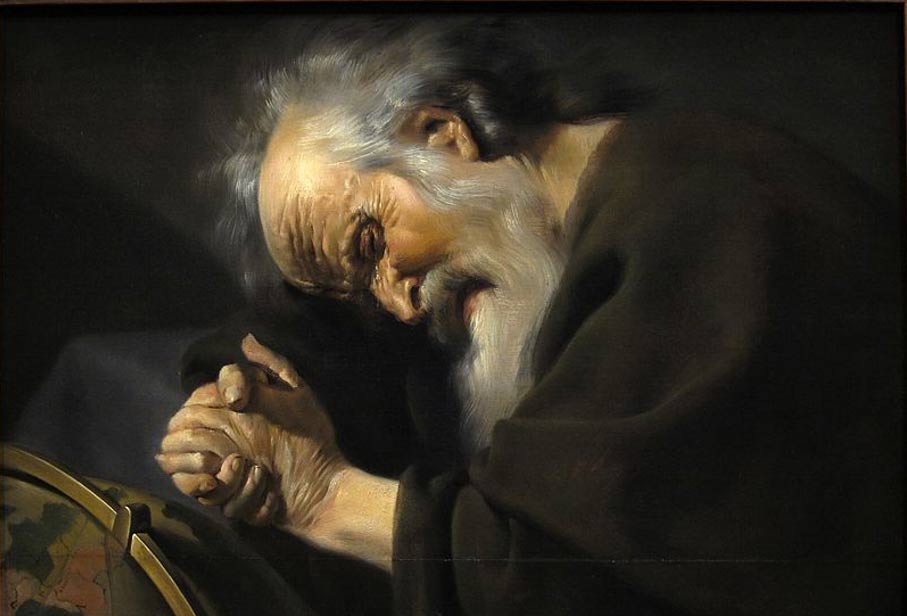Heraclitus: Eminent Doctrines of a Pre-Socratic Riddler who Loved Conflict
Heraclitus of Ephesus was a Pre-Socratic philosopher who lived during the 6th century BC. He wrote a book which recorded his controversial philosophical thoughts. This book, which was deposited in the temple of Artemis at Ephesus, has not survived in its entirety. Nevertheless, more than 100 fragments have endured the passage of time and have been creating as much debate as the philosopher probably would have liked!
Through these fragments, Heraclitus’ philosophical thoughts are more directly approachable by modern scholars than those of his predecessors, such as Thales and Anaximander. Heraclitus’ philosophical doctrines were wide-ranging, and included his ideas on cosmology, morality, religion, and politics.

Heraclitus with a globe. (Public Domain)
Heraclitus’ Life and Personality
Heraclitus was born around 540 BC, and was a citizen of Ephesus, an ancient Greek city on the Ionian coast of modern day Turkey. According to the biographer Diogenes Laertius, Heraclitus’ father was a man by the name of either Blyson or Heraceon.
Strabo writes that the family of Androclus, the founder of Ephesus, were entitled to hold a kingship, which was both hereditary and, possibly, largely honorary. Heraclitus was a descendant of Androclus, though he had “yielded to his brother the title and privileges of royalty”.
- Alchemy and Immortality – The Tale of Nicolas Flammel and the Lapis Philosophorum
- Plato and his Hidden Music Code
- From Magic to Science: The Intriguing Ritual and Powerful Work of Alchemy
According to Diogenes, Heraclitus was “above all men of a lofty and arrogant spirit”, and was known for the contempt he held against his predecessors. For example, in one of his fragments (also quoted by Diogenes), Heraclitus wrote that “Abundant learning does not form the mind; for if it did, it would have instructed Hesiod, and Pythagoras, and likewise Xenophanes, and Hecataeus.” He also shows his feelings of superiority in the following fragment:
“Of this Word’s being forever do men prove to be uncomprehending, both before they hear and once they have heard it. For although all things happen according to this Word, they are like the unexperienced experiencing words and deeds such as I explain when I distinguish each thing according to its nature and show how it is. Other men are unaware of what they do when they are awake just as they are forgetful of what they do when they are asleep. (B1)”

Heraclitus (with his face in the style of Michelangelo) sits apart from the other philosophers in Raphael's School of Athens. (Public Domain)
Apart from other philosophers, Heraclitus is recorded as hating basically everyone else. An interesting example of this is told by Diogenes in a supposed contact between Heraclitus and King Darius, son of Hystaspes. The king is said to have commended the philosopher and requested an audience with him in the following way:
“You are the author of a treatise On Nature which is hard to understand and hard to interpret. In certain parts, if it be interpreted word for word, it seems to contain a power of speculation on the whole universe and all that goes on within it, which depends upon motion most divine; but for the most part judgement is suspended, so that even those who are the most conversant with literature are at a loss to know what is the right interpretation of your work. Accordingly King Darius, son of Hystaspes, wishes to enjoy your instruction and Greek culture. Come then with all speed to see me at my palace. For the Greeks as a rule are not prone to mark their wise men; nay, they neglect their excellent precepts which make for good hearing and learning. But at my court there is secured for you every privilege and daily conversation of a good and worthy kind, and a life in keeping with your counsels.”
But his praise and invitation was met with the following cold response by Heraclitus:
"All men upon earth hold aloof from truth and justice, while, by reason of wicked folly, they devote themselves to avarice and thirst for popularity. But I, being forgetful of all wickedness, shunning the general satiety which is closely joined with envy, and because I have a horror of splendour, could not come to Persia, being content with little, when that little is to my mind."
Illness Strikes
Even more unsought on Heraclitus’ personality comes from this writing by Diogenes, “And at last becoming a complete misanthrope, he used to live, spending his time in walking about the mountains; feeding on grasses and plants.”

‘Heraclitus and Democritus’ by Jan van Bijlert, Centraal Museum, Utrecht, Netherlands. (Public Domain)
Due to these habits, Heraclitus suffered from dropsy (a less technical term for edema). When the philosopher returned to the city, he “asked the physicians, in a riddle, whether they were able to produce a drought after wet weather.” They, however, did not understand what Heraclitus was trying to say, and could not prescribe any medication for him.
Therefore, Heraclitus “shut himself up in a stable for oxen, and covered himself with cow-dung, hoping to cause the wet to evaporate from him, by the warmth that this produced.”
Heraclitus’ Doctrines on Change and the Unity of Opposites
This self-medication not only failed to cure Heraclitus, but may have actually resulted in his death. However, it has been said that this anecdote of Heraclitus’ death is probably an invention based on the philosopher’s own writings.
In one of his fragments, it is written that “it is death for souls to become water.” In another fragment, Heraclitus expounds his doctrine of exhalations or evaporations, in which fire turns into water and vice versa. These fragments are said to be the bases for the story of Heraclitus’ death.
One of Heraclitus’ best-known doctrines is that things are always changing (universal flux), characterized, for instance, in the second fragment mentioned in the previous paragraph. Heraclitus wrote that “The turnings of fire: first, sea; and of sea, half is earth and half fiery waterspout…. Earth is poured out as sea, and is measured according to the same ratio ( logos) it was before it became earth.”
In other words, water from the sea changes into both fire (by means of a fiery waterspout, which is a hurricane funnel illuminated by lightning) and earth.

Crying Heraclitus and laughing Democritus, from a 1477 Italian fresco, Pinacoteca di Brera, Milan. (Public Domain) Some believe that Heraclitus did not complete some of his works because of melancholia. This perception led to him being known as the "weeping philosopher," as opposed to Democritus, who is known as the "laughing philosopher.”
Another well-known Heraclitean doctrine is that of the unity of opposites. This doctrine may be separated into several groups. One group speaks of objects that have contradictory properties from different points of view. For example, in one fragment, it is written that “The sea is the purest and most polluted water: to fishes drinkable and bringing safety, to humans undrinkable and destructive.”
Another group deals with opposites which, while being in opposition to each other, are each necessary for the recognition of the other. For instance, “Disease makes health pleasant and good, hunger [does the same for] satiety, weariness [for] rest.”
- The Terrifying Doomsday Prophecy of the Tiburtine Sibyl
- Dreams and Prophecy in Ancient Greece
- Earth, Air, Fire, and Water: Empedocles of Acragas - The Pre-Socratic Philosopher with a Sense of Style
Yet another group deals with opposite qualities that occur successively. For example, “Cold things grow hot, a hot thing cold, a moist thing withers, a parched thing is wetted.”
These doctrines along with his cryptic statement that "all entities come to be in accordance with this Logos" (literally, "word", "reason", or "account") have been the subject of numerous interpretations over the years. Thus, the (in)famy of the Pre-Socratic “Riddler” continues.

Heraclitus (1628) by Hendrick ter Brugghen. (Public Domain)
Top Image: A 17th century painting of Heraclitus, by Johannes Moreelse. Source: Public Domain
By Ḏḥwty
References:
Diogenes Laertius, The Lives and Opinions of Eminent Philosophers: Life of Heraclitus [Online]
[Yonge, C. D. (trans.), 1853. Diogenes Laertius’ The Lives and Opinions of Eminent Philosophers: Life of Heraclitus.]
Available at: http://www.classicpersuasion.org/pw/heraclitus/dlheraclitus.htm
Graham, D. W., 2015. Heraclitus. [Online]
Available at: http://plato.stanford.edu/entries/heraclitus/#UniOpp
Graham, D. W., 2016. Heraclitus (fl. c. 500 B.C.E.). [Online]
Available at: http://www.iep.utm.edu/heraclit/
Marvin, C., 2000. Heraclitus of Ephesus. [Online]
Available at: http://www.trincoll.edu/depts/phil/philo/phils/heraclitus.html
McKirahan, R. D., 2010. Philosophy Before Socrates. 2nd ed. Indianapolis: Hackett Publishing Company, Inc.



















